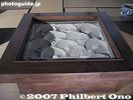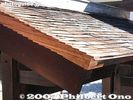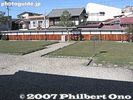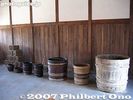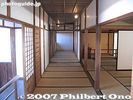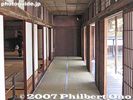 Image search results - "government" Image search results - "government" |

Gate to Takayama Jinya
|
|

Entrance to Takayama Jinya. A Jinya was a regional government office during the Edo Period. The Tokugawa government dispatched magistrates to administer the region. About 60 jinya existed and only this one survives.
|
|

For 176 years or 25 generations, the building housed government administrators, accountants (rice tax collectors), and the police.
|
|
|

Magistrate's (governor) office 御役所
|
|

View of Administrator's office from the veranda
|
|
|

The main building was built in 1816.
|
|
|
|
|
|
|
|
|
|
|
|
|
|
|
|
|

Magistrate's living quarters 居宅(嵐山の間)
|
|
|
|
|
|
|
|
|

Bath area
|
|

Toilet
|
|

Kitchen
|
|
|

Large Hall (Dai-hiroma)
|
|

Large Hall (Dai-hiroma) where ceremonies and meetings were held. It could also be partitioned into three rooms. Total area is 48 tatami mats. 大広間
|
|
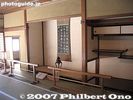
Tokonoma alcove
|
|
|
|
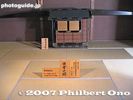
Palanquin
|
|
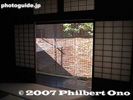
Bamboo screen
|
|
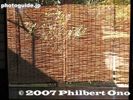
Bamboo screen
|
|

Torture room 吟味所・御白洲
|
|
|
|

Entrance to Rice Storehouse. 御蔵
|
|

National Diet of Japan 国会議事堂
|
|

The National Diet building (Kokkai Gijido in Japanese) was built in Nov. 1936 after 17 years of construction. 国会議事堂
|
|

The Central Tower is 9 stories high. Below it is the Central Entrance whose bronze doors are opened only for the Emperor of Japan, State Guests, and new Diet members on the first day of a Diet session.
|
|

The building is perfectly symmetrical on the left and right. On the left is the House of Representatives (Shugiin). 衆議院
|
|

On the right is the House of Councillors (Sangi-in). 参議院
|
|

Side view of the House of Councillors (Sangi-in).
|
|

The National Diet is Japan's political and legislative center. The capital of Japan. Free 60-min. tours (in Japanese only) are conducted every hour every day when the Diet is not in session.You can see the House of Councillors (Sangiin), the central tower, and the Emperor's Room.
|
|

Central Tower
|
|

Guarded entrance to National Diet
|
|

Inside the Central Tower. Stained glass and murals depicting the four seasons.
|
|

The free tour starts by going down to the House of Councillors Visitors' Lobby.
|
|

House of Councillors Visitors' Lobby. Various exhibits are here. 参観ロビー
|
|

Sample of various stones used in the building. As much as possible, domestic materials were used in the construction.
|
|

Ballot box and ballot slips. 投票箱・木札
|
|

Throne used by the Emperor in the National Diet during the Meiji Period. 御椅子
|
|

Signboard for nobles
|
|

Diet pins. Photography is not allowed inside the building outside this lobby.
|
|

Built in 1888, the former Hokkaido Government Office Building is one of Hokkaido's most famous buildings at the heart of Sapporo. With its red brick walls, it stands out among Sapporo's more modern buildings.
|
|

The building was akin to Hokkaido's capitol where the governor's office was located. It was used for 80 years. Open 9 am - 5 pm, closed Dec. 29-Jan. 3. Free admission. Near Sapporo Station's south exit and visible from Ekimae-dori road.
|
|

Nicknamed "Akarenga Chosha" (Red Brick Government Building), a fire in 1909 gutted the interior, but the exterior was little damaged. The building was restored in 1911. 赤れんが庁舎
|
|

Most of the building materials, stones and wood, were procured from Hokkaido. The building is flanked by yaezakura cherry trees which bloom in early May.
|
|

Tulips also give a colorful touch to the grounds. In 1968, the building was restored to its original state, and it has been preserved since then. It has an American Neo-baroque style.
|
|

In March 1969, it was designated as an Important Cultural Property. Its 2.5 million bricks were made locally and laid in a French style.
|
|
|
|

The roof has chimney-like ventilation outlets.
|
|
|
|

Former Hokkaido Government Office Building and tulips, Sapporo
|
|

Former Hokkaido Government Office Building and yaezakura cherry blossoms, Sapporo
|
|

Adjacent pond and cherry blossoms
|
|
|
|

G8 Summit countdown sign
|
|

The interior of the Former Hokkaido Government Office Building is just as dignified as the exterior. This triple-arch staircase is what you first see when you enter the building.
|
|

Rear of the triple-arch staircase.
|
|

Going to the 2nd floor.
|
|

Most of the rooms open to the public are on the 2nd floor.
|
|

Staircase and G8 Summit sign
|
|

Second floor corridor.
|
|

On the right is the entrance to the former Governor's office
|
|

The second floor has several large rooms. This is the Hokkaido Archives where Hokkaido's historical documents and records are kept.
|
|

Cannon balls
|
|

Inside the former office of the Governor. There's a large conference table and the walls are decorated with portraits of past Hokkaido governors.
|
|

Portraits of past Hokkaido governors. The bottom row are the most recent governors.
|
|

A stately room. The governor's desk is in the right corner.
|
|

Governor's desk in the governor's former office.
|
|

Another room on the 2nd floor shows Hokkaido's international relations with sister states in Alberta, Canada; Massachusetts, USA; and Heilongjiang, China.
|
|

From Alberta, Canada
|
|

From Massachusetts, USA. The famous Dr. William Clark was from this US state.
|
|

Photos of international sister state exchanges.
|
|

Red bricks
|
|

Karafuto/Sakhalin Resource Library
|
|

Hokkaido History Gallery occupies another room on the 2nd floor.
|
|

Hokkaido History Gallery includes wildlife exhibit.
|
|

There's also the Northern Territories Room with exhibits clamoring for the return of the northern territories (Shikotan, Habomai, Etorofu). now occupied by Russia.
|
|
|
|

Petition for the return of the Northern Territories. As of late April 2008, over 80.3 million people signed the petition.
|
|

Poster for the return of the Northern Territories
|
|

Poster for the return of the Northern Territories. Her braided hair resembles the northern islands.
|
|

First floor corridor. Most of the rooms on the 1st floor are closed to the public.
|
|

Point Zero for Hokkaido's travel distances.
|
|

Along the road to the former government building are display panels about Hokkaido's hisotry. Here's one about the early foreigners in Hokkaido.
|
|
|
|
|






